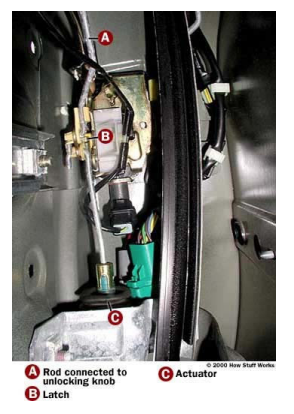Toyota Facing Class Action Lawsuit Over Allegedly Defective Door Lock Actuators
Mixon et al. v. Toyota Motor Corporation et al.
Filed: November 15, 2024 ◆§ 4:24-cv-01018
A proposed class action lawsuit alleges the door lock actuators on nearly a dozen Toyota vehicle models are defective.
Toyota Motor Corp. Toyota Motor North America, Inc. Toyota Motor Sales, U.S.A., Inc. Toyota Motor Engineering and Manufacturing North America, Inc.
Magnuson-Moss Warranty Act New York General Business Law Florida Deceptive and Unfair Trade Practices Act Georgia Fair Business Practices Act Georgia Uniform Deceptive Trade Practices Act North Carolina Unfair and Deceptive Trade Practices Act Texas Deceptive Trade Practices Act Indiana Deceptive Consumer Sales Act
Texas
A proposed class action lawsuit alleges the door lock actuators on nearly a dozen Toyota vehicle models are defective given their apparent propensity to prematurely fail, such that a door cannot be locked or unlocked with a remote key fob or the interior power door locks.
Want to stay in the loop on class actions that matter to you? Sign up for ClassAction.org’s free weekly newsletter.
The 147-page Toyota lawsuit alleges the door lock actuator defect, impacting the small motor that moves the door latch up and down, was present in the following vehicle models when they rolled off the assembly line, and typically manifests during or shortly after the end of the automaker’s limited warranty period:
- 5th Gen (2010 – 2024) 4Runner;
- 4th Gen (2013 – 2018) and 5th Gen (2019 – Present) RAV4;
- 3rd Gen (2014 – 2019) and 4th Gen (2020 – Present) Highlander;
- 3rd Gen (2010 – 2015) and 4th Gen (2016 – 2022) Prius;
- 2nd Gen (2007 – 2021) and 3rd Gen (2022 – Present) Tundra;
- 7th Gen (2012 – 2017) and 8th Gen (2018 – 2024) Camry;
- 2nd Gen (2012 – 2017) and 3rd Gen (2018 – 2024) Camry Hybrid;
- 11th Gen (2014 – 2019) and 12th Gen (2020 – Present) Corolla;
- 2nd Gen (2005 – 2015) and 3rd Gen (2016 – 2023) Tacoma; and
- 2007 – 2014 FJ Cruiser.
“Once the door lock actuators cease operating properly, the door locking mechanism fails to function as intended and expected,” the Toyota class action summarizes.

According to the suit, the Toyota door lock defect poses a significant safety hazard in that a single or multiple doors may not lock at any time, whether the vehicle is on or off and despite actions or commands by the driver. The alleged defect is dangerous to passengers as it can cause unintentional door openings while a vehicle is in use, result in inoperable doors during emergency situations, and leave a vehicle and any contents therein more vulnerable to theft, the filing alleges.
“The doors of Class Vehicles may not lock or unlock electronically despite the necessary commands. This poses serious safety concerns, for example when Class Vehicles are involved in vehicular accidents because the occupants may become entrapped when the Door Actuator Defect prevents an occupant from unlocking the doors. Furthermore, this defect jeopardizes the safety of Vehicle occupants given that not all doors are capable of being manually unlocked from the exterior.”
The lawsuit alleges Toyota has not only actively concealed that the door locking actuator was defective but failed to reveal that the existence of the problem would diminish the overall and resale value of affected vehicle models. The case alleges the automaker has routinely refused to repair the vehicle models listed on this page when the door lock defect manifests outside the warranty period.
In fact, the suit claims, Toyota has often conveyed to drivers that the failed door lock actuators were considered “maintenance” and/or “wear” items, and thus not covered under warranty.
“Failure of a door actuator is not a normal ‘wear and tear’ item, nor is it a component that is expected to be repaired or replaced on regular intervals,” the filing argues.
When the problem arises in-warranty, Toyota will merely replace a faulty door lock actuator with similarly defective and “inherently failure-prone” components, the case says.
To date, there has been no Toyota recall over the alleged door lock actuator problems, the lawsuit notes.
The Toyota door lock class action looks to cover all individuals or entities in the United States who are current or former owners and/or lessees of any Toyota vehicle model listed on this page.
Check out our class action rebates page full of open class action settlements, including some that require no proof.
Video Game Addiction Lawsuits
If your child suffers from video game addiction — including Fortnite addiction or Roblox addiction — you may be able to take legal action. Gamers 18 to 22 may also qualify.
Learn more:Video Game Addiction Lawsuit
Depo-Provera Lawsuits
Anyone who received Depo-Provera or Depo-Provera SubQ injections and has been diagnosed with meningioma, a type of brain tumor, may be able to take legal action.
Read more: Depo-Provera Lawsuit
How Do I Join a Class Action Lawsuit?
Did you know there's usually nothing you need to do to join, sign up for, or add your name to new class action lawsuits when they're initially filed?
Read more here: How Do I Join a Class Action Lawsuit?
Stay Current
Sign Up For
Our Newsletter
New cases and investigations, settlement deadlines, and news straight to your inbox.
Before commenting, please review our comment policy.